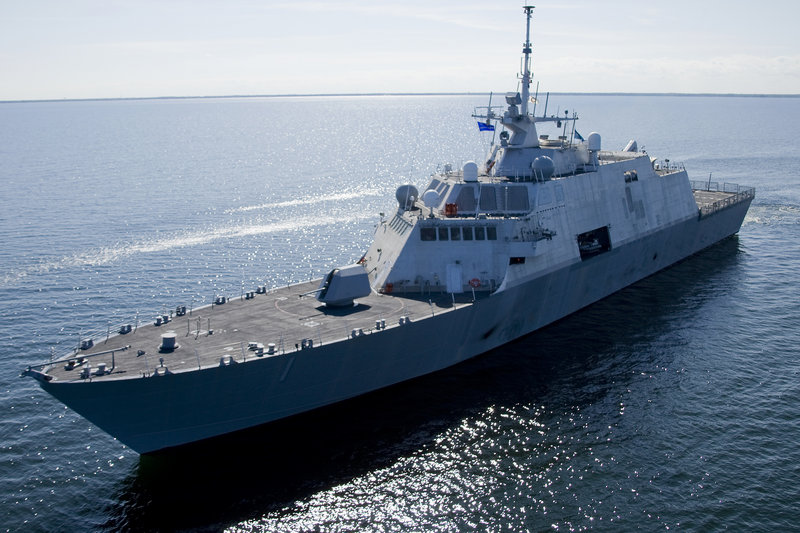PORTLAND – A Navy proposal to award lucrative contracts for a new class of speedy warships to shipyards in Alabama and Wisconsin could shut Maine’s Bath Iron Works out of any chance to build the vessels, Sen. Susan Collins said Tuesday.
The Navy plans to increase the number of so-called littoral combat ships and to award construction contracts to Alabama-based Austal USA and Wisconsin-based Marinette Marine, Collins said.
The Navy proposal “represents an unexpected reversal of its procurement plans” and would make it unlikely that Bath Iron Works could compete to build any of the ships, said Collins, a Maine Republican who serves on the Armed Services Committee.
The ships are coveted by the Navy for their speed — both versions can top 50 mph — and for their ability to operate in coastal, or littoral, waters.
BIW was the prime contractor for two of the first three littoral ships. But the ships were actually built by Bath’s then-partner, shipbuilder Austal. A competing littoral ship was designed by Lockheed Martin and built by Marinette.
The Navy initially planned to buy ships of both designs. Later, however, the Navy decided to buy only 10 ships from the manufacturer of the winning design, and to bid out a contract for another five ships as early as 2012. Only contractors that did not win the initial bid would be permitted to compete for the additional five.
Bath wanted to bid on the five-ship contract regardless of which version was selected. In order to qualify to do that, BIW terminated its contract with Austal earlier this year. But last week, the Navy floated a proposal to once again build both versions, with the 20 ships split between Austal and Marinette.
If Congress approves the request, BIW and other shipbuilders might no longer have an opportunity to bid on the ships, said Cynthia Brown, president of the American Shipbuilding Association, which represents the nation’s six largest shipbuilders.
The Navy’s move hasn’t yet been approved by Congress. And even if approved, it won’t necessarily rule out future bidding if either Austal or Marinette failed to fulfill the terms of the contract, Brown said.
Collins didn’t indicate Tuesday whether she would fight the proposal.
The new strategy has been met with silence by BIW, a General Dynamics subsidiary, which traditionally builds larger destroyers but has reduced its work force in recent years because of Navy spending cuts. Spokesman Jim DeMartini had no comment Tuesday.
BIW, which employs 5,500 shipbuilders, has been looking to supplement its traditional work with construction of Coast Guard cutters or possibly the smaller Navy ships.
The littoral combat ships are key to the Navy’s goal of building up its fleet, and the original bids from Austal and Marinette were low enough to allow the Navy to buy more ships.
“This option is good for the taxpayers because it enables us to buy more ships for the same money and allows us to lock in a lower price for all 20 ships,” Navy Secretary Ray Mabus said in a statement last week. “It’s good for the Navy because it gets us more ships faster and increases our flexibility, and it’s good for industry because it maintains and even expands jobs at two shipyards.”
BIW is currently wrapping up a production run of Arleigh Burke destroyers and is building the first of three Zumwalt-class destroyers. Littoral combat ships are much smaller than those ships.
Austal’s ship is a 418-foot aluminum trimaran, while Marinette’s 378-foot version uses a single steel hull. Both ships can accommodate helicopters and “modules” for anti-submarine missions, mine removal or traditional surface warfare.
Jonathan Hemmerdinger, a staff writer, contributed to this story.
Send questions/comments to the editors.



Success. Please wait for the page to reload. If the page does not reload within 5 seconds, please refresh the page.
Enter your email and password to access comments.
Hi, to comment on stories you must . This profile is in addition to your subscription and website login.
Already have a commenting profile? .
Invalid username/password.
Please check your email to confirm and complete your registration.
Only subscribers are eligible to post comments. Please subscribe or login first for digital access. Here’s why.
Use the form below to reset your password. When you've submitted your account email, we will send an email with a reset code.